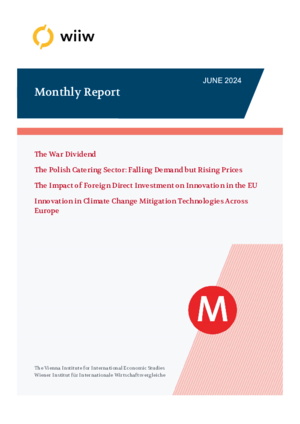Monthly Report No. 6/2024
Aleksandr Arsenev, Chiara Castelli, Ronald B. Davies, Javier Flórez Mendoza, Mahdi Ghodsi, Francesca Micocci and Leon Podkaminer
wiiw Monthly Report No. 6, June 2024
56 pages including 4 Tables and 30 Figures
- Chart of the month: The war dividend
by Aleksandr Arsenev
- The Polish catering sector: falling demand but rising prices
by Leon Podkaminer
Recent data suggest that while demand for the services of Polish catering companies may be falling, the prices charged by larger firms – and their profits – are rising. Cooling the economy through restrictive macro policy reduces demand, but eliminates a swathe of smaller producers, making life easier for those firms that survive. They can generate above-average profits by charging more than the ‘normal’ prices that obtain under more effective competition.
- The impact of foreign direct investment on innovation in the EU
by Francesca Micocci and Mahdi Ghodsi
This study examines the influence of foreign direct investment (FDI) on innovation within European regional industries. Using the number of patents as a measure of innovation, we find compelling evidence to support FDI’s positive impact. Notably, among the measures of FDI explored, mergers and acquisitions (M&A) activity has the biggest effect on innovation, suggesting that this is a fundamental channel for knowledge transfer to the firms acquired and their markets.
- Innovation in climate change mitigation technologies across Europe
by Chiara Castelli, Ronald B. Davies, Javier Flórez Mendoza, Mahdi Ghodsi and Francesca Micocci
Innovation can act as an effective instrument for climate change mitigation (CCM), fostering the green transition. This study aims to assess regional technological capabilities in the climate change domain through two main innovation channels: technological specialisation and foreign direct investment (FDI) in green technologies over the period 2008-2018. The main findings reveal significant disparities across European regions, especially among the less developed areas. As such, while some transition regions have great potential to become attractive hubs for green innovators, others still need more structural interventions to cope with the challenges of implementing the twin green and digital transitions.
- Monthly and quarterly statistics for Central, East and Southeast Europe
Reference to wiiw databases: wiiw Annual Database, wiiw Monthly Database
Keywords: war dividend, defence contractors, stock prices, catering sector, inflation, consumer demand, market structure, innovation, greenfield FDI, M&As, climate change mitigation, technological specialisation, FDI
Countries covered: EU, Europe, Poland, US
Research Areas: Regional Development, Sectoral studies
